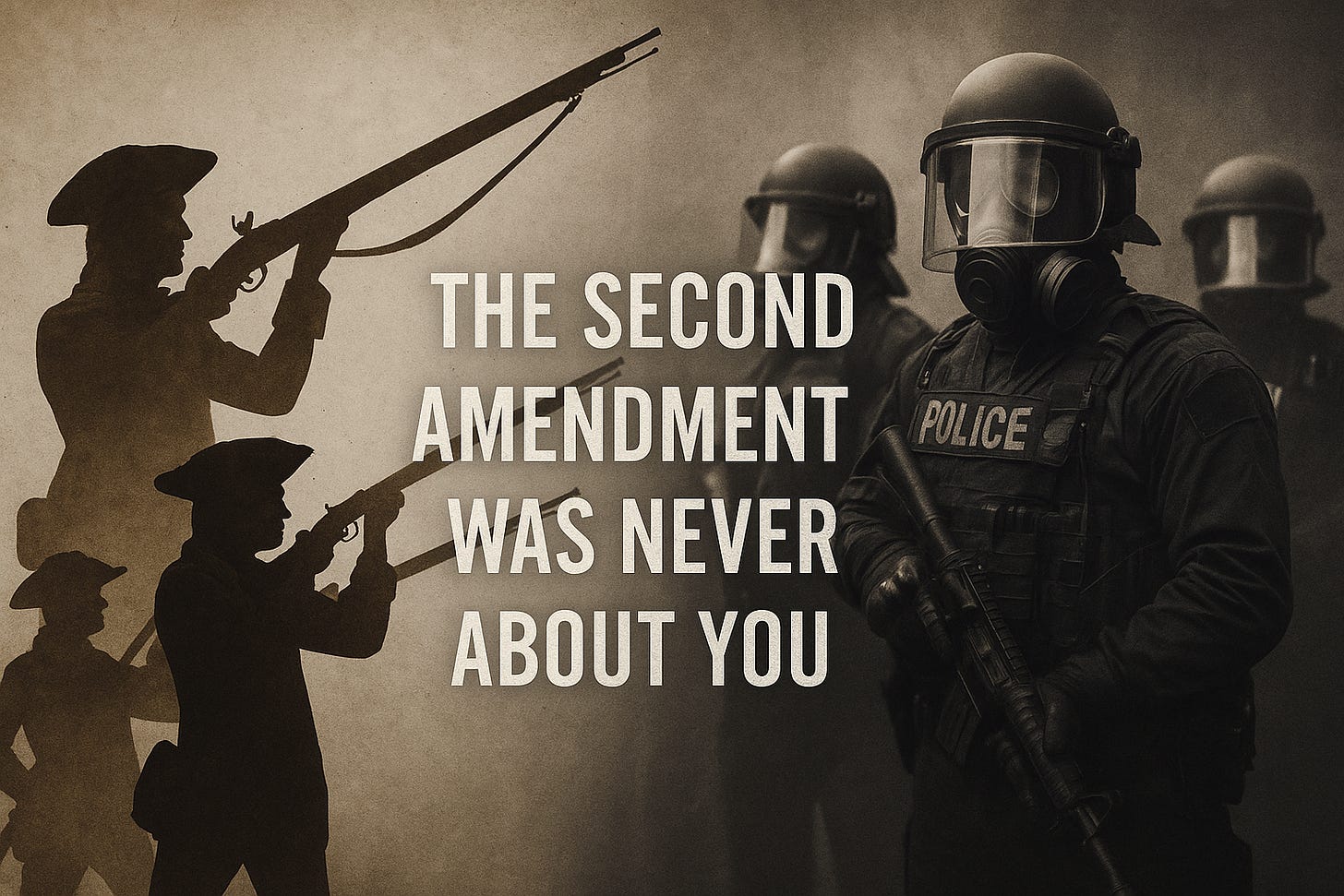Tyranny is here, where is the militia?
we examine the second amendment through the lens of critical race theory #whitehistoryminute
The Second Amendment Was Never About You
Where are all the “defend liberty from tyranny” Second Amendment folks now that the government is surveilling, censoring, and federalizing protest crackdowns? You’d think this would be their Super Bowl.
But it’s crickets.
That silence says a lot—because the Second Amendment was never about standing up to tyranny. Not the way we like to tell it
.
The Myth of “Defending Freedom”
The story we grow up with goes something like this:
“The Founding Fathers wanted citizens armed so they could resist a tyrannical government.”
Sounds righteous, right? But it’s not true.
When the Constitution was written, every colony already had its own militia—state-run, community-organized fighting forces. Those militias became the Continental Army during the Revolution. When independence came, the colonies didn’t want to give up that power. They didn’t trust a national army under federal control.
Why? Because armies cost money—and Congress decides where that money goes. If your state wasn’t in favor with Congress, your militia might get ignored, underfunded, or dissolved.
So when the Second Amendment says “A well-regulated militia, being necessary to the security of a free state…” — that “state” doesn’t mean the people. It means the states. Literally.
The Real Fear Behind the Amendment
And here’s the ugly truth:
The Founders’ biggest fear wasn’t “tyranny.” It was rebellion—specifically, slave rebellions.
States like Virginia and South Carolina depended on armed militias to suppress uprisings and patrol enslaved people. They worried that if Congress controlled the military, those federal troops might be sent elsewhere—leaving local slave patrols undermanned.
So the Second Amendment wasn’t written to protect you from the government. It was written to protect the states—and the slave economy—from the government.
It guaranteed that each state could keep its own armed force under its own control, just in case enslaved people got any ideas about freedom before the nation was ready to give it to them.
That’s not a conspiracy theory. It’s in the historical record. James Madison himself had to sell the Bill of Rights to skeptical Southern states by reassuring them that their “domestic security” (read: slave patrols) wouldn’t be interfered with.
Guns Were Tools, Not Politics
Back then, it was unthinkable that individual citizens wouldn’t own guns. They were as common as horses or hammers. Nobody called that “bearing arms.” That was just survival.
So when we argue today about “the right to bear arms,” we’re using 21st-century fears to interpret an 18th-century system. They weren’t talking about individuals defending themselves from tyranny. They were talking about states defending their budgets and their “property.”
The Modern Irony
Fast forward to now. The Posse Comitatus Act says federal troops can’t be used against citizens—except to protect their rights when they’re being deprived.
But look around. The federal government is deploying troops and militarized federal agents against protesters, journalists, and immigrants. Meanwhile, ICE continues to operate in defiance of local and state protections.
If governors actually activated their National Guards to protect their citizens’ rights—from unlawful detention, deportation, or suppression—then the federal government would lose its pretext to “restore order.”
That’s the irony. The real “well-regulated militia” today might not be the fantasy of armed citizens storming the Capitol. It might be state governors using their legal authority to shield their people from federal overreach.
A Call to Action
So, to all those Second Amendment purists:
If this is truly about defending liberty from tyranny—then where are you now?
To the governors:
If you really believe in states’ rights, in the freedom of your citizens—then deploy your troops. Not against protesters. But to protect them.
The Constitution gives you that right.
History demands that you use it.
Q for You:
If the Second Amendment had been written today—without the shadow of slavery—what do you think it would actually protect?

